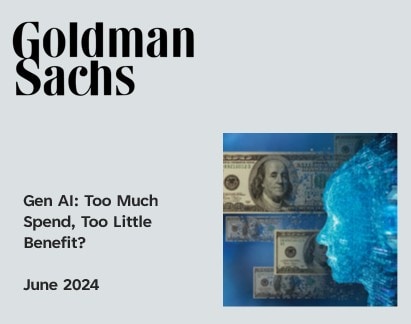RESEARCH
Goldman Sachs: Gen AI: Too Much Spend, Too Little benefit?

Goldman Sachs Research analysts and industry experts explore the potential of generative AI to transform economies, industries, and societies, and whether the large spending on AI infrastructure will pay off.
MIT professor Daron Acemoglu is skeptical about AI’s short-term economic impacts, estimating limited effects on productivity and GDP growth in the next decade due to the focus and architecture of current generative AI technology.
Goldman Sachs Head of Global Equity Research Jim Covello argues that AI technology must solve complex problems to justify its costs, which it isn’t designed to do. Covello also expresses doubt about AI’s ability to significantly boost company valuations or replicate human cognitive capabilities.
Goldman Sachs analysts Kash Rangan and Eric Sheridan are more optimistic, believing that the potential returns from the current AI capex cycle are promising. They note that current spending levels are not significantly different from prior tech investment cycles.
Even with potential benefits, AI growth could be constrained by shortages of chips and power. Goldman Sachs semiconductor analysts Toshiya Hari, Anmol Makkar, and David Balaban expect chip shortages in the next few years. Cloverleaf Infrastructure Co-founder Brian Janous and Goldman Sachs utilities analysts Carly Davenport and Alberto Gandolfi suggest power supply may not keep up with the demands of AI technology and data centers, potentially leading to a power crunch.
Despite concerns, there is room for the AI theme to grow in the markets, with AI infrastructure providers and utilities potentially benefiting. However, for above-average long-term S&P 500 returns, AI must significantly boost trend growth and corporate profitability without raising inflation.